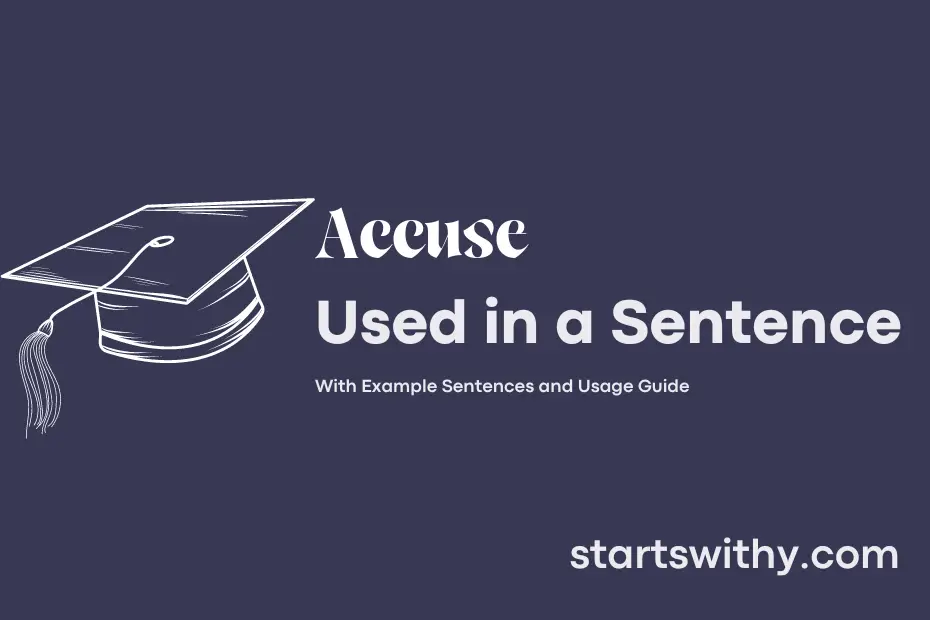Accusing someone means to assert that they have committed a wrongdoing or offense, often done with the intention of assigning blame or responsibility. It involves attributing a specific action or behavior to another individual, whether based on evidence or suspicion.
When accusing someone of something, it is important to consider the potential consequences of such an allegation and approach the situation with caution. Emotions can run high when accusations are made, so it is crucial to communicate clearly and respectfully in order to navigate the situation effectively.
7 Examples Of Accuse Used In a Sentence For Kids
- Accuse is when you say someone did something wrong.
- Please don’t accuse your friends without knowing the truth.
- It is not nice to accuse others without any proof.
- Always think before you accuse someone of something.
- Remember to apologize if you accuse someone by mistake.
- Let’s not accuse anyone without checking the facts.
- It’s important to be honest and not accuse others unfairly.

14 Sentences with Accuse Examples
- Accuse me of cheating, but I swear I studied all night for this exam.
- I will accuse you of not pulling your weight in the group project if you don’t start contributing soon.
- Please don’t accuse me of skipping classes without knowing the whole story.
- Accuse them of stealing your notes only if you have solid proof.
- I heard some classmates accuse the professor of being biased in their grading.
- If you miss the deadline, your group members may accuse you of being the reason for the project’s failure.
- It’s not fair to accuse someone of plagiarism without proper evidence.
- I hope they don’t accuse us of vandalizing the campus property during the protest.
- Accuse the administration of turning a blind eye to the students’ mental health struggles.
- Don’t let anyone accuse you of not giving your best effort in your academic pursuits.
- I would never accuse my friends of betraying me without having an honest conversation first.
- Some students may accuse the college authorities of not providing enough resources for research projects.
- When tensions rise during debates, it’s common for participants to accuse each other of being dishonest.
- If your roommate uses your belongings without permission, you have the right to accuse them of invading your personal space.

How To Use Accuse in Sentences?
To Accuse means to charge someone with a wrongdoing or to blame them for something. Here is a guide on how to use this word in a sentence:
Subject + “Accuse” + Object + Preposition + Crime:
- Example: The police accused the man of theft.
Subject + “Accuse” + Object + Conjunction + Subject + Verb:
- Example: Sarah accused her friend but he denied the accusation.
Subject + “Accuse” + Object + Of + Noun/Noun Phrase:
- Example: The teacher accused Mark of cheating on the test.
Subject + “Accuse” + Object + Adverb/Adjective:
- Example: The lawyer accused the witness falsely.
Subject + Passive Verb + “Accused” + By + Subject:
- Example: The CEO was accused by the employees for unethical behavior.
Remember to always use the word Accuse before naming the person being accused, and be clear about what they are being accused of. Make sure to include any necessary prepositions or conjunctions to connect the parts of the sentence correctly.
By following these guidelines, you can effectively use Accuse in your writing and conversations.

Conclusion
In conclusion, accusations can have serious consequences for individuals who are wrongly accused. It is important to thoroughly investigate claims and gather evidence before making accusations to avoid potentially damaging someone’s reputation or livelihood. Accusations should be made responsibly and with care to ensure fairness and justice for all parties involved.
Furthermore, being on the receiving end of false accusations can be exceedingly difficult and can have long-lasting effects. It is essential for accusers to consider the impact of their words and actions, as baseless accusations can harm relationships, careers, and overall well-being. Clear communication, empathy, and a commitment to truth and fairness are crucial in navigating situations involving accusations.



